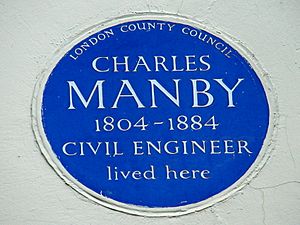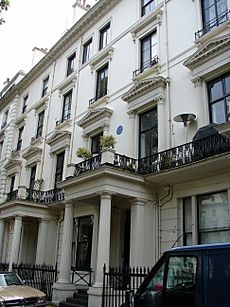Charles Manby facts for kids
Quick facts for kids
Charles Manby
|
|
|---|---|

Blue plaque commemorating Manby
|
|
| Born | 4 February 1804 |
| Died | 31 July 1884 (aged 80) London, England
|
| Nationality | British |
| Occupation | Civil Engineer |
| Known for | Secretary of the Institution of Civil Engineers |
| Partner(s) |
|
| Parent(s) |
|
Charles Manby (born February 4, 1804 – died July 31, 1884) was a very important engineer in Britain. He was the Secretary of the Institution of Civil Engineers for many years. He also helped build the first iron ship that crossed the English Channel.
Charles Manby spoke French very well. This skill helped him with projects in Paris, like installing gas pipes. He also gave advice on building the famous Suez Canal.
Contents
Early Life and Training
Charles Manby was born in Cowes, on the Isle of Wight. His parents were Aaron and Juliana Manby. His father, Aaron Manby, was a very successful engineer. He built bridges, ships, and engines.
As a child, Charles went to a Roman Catholic school. In 1814, he attended Saint-Servan College in France. He came back to England in 1815.
Becoming an Engineer
Charles's father owned a company called the Horseley Ironworks. This company was in Tipton, Staffordshire. In 1817, Charles began training there to become an engineer. He learned from famous engineers like John Rennie and Thomas Telford.
During his training, Charles helped with big projects. One important project was building an iron paddleship called the Aaron Manby. This ship was made in parts at the Ironworks. Then, it was taken to London and put back together.
Charles Manby, even at just 18 years old, helped put the ship's steam engine together. He was the chief engineer for its first trip on June 10, 1822. The ship sailed across the English Channel. It became the first iron ship to carry goods from London to Paris.
Work in France
In 1823, Charles Manby started working in Paris. He helped install pipes for hydrogen gas. He worked for a French company that his father had helped start.
While in France, Manby also helped reorganize an ironworks factory. His ability to speak French well was very useful throughout his life. Later, the French government hired him to work on their state-owned tobacco factories.
Back in the UK
Charles Manby later returned to the UK. He managed the Beaufort Iron Works in Wales. In 1830, he married Ellen Jones there.
He then moved to London in 1834. There, he worked as a civil engineer. He and a partner created a new ventilation system for buildings.
Leading the Institution of Civil Engineers
In November 1839, Charles Manby became the Secretary of the Institution of Civil Engineers (ICE). This is a very important group for engineers. He held this job until 1856.
When he retired from the role, he received a special award and money. His former assistant, James Forrest, took over as Secretary. Manby stayed involved with the ICE as an Honorary Secretary until he died.
Other Key Projects
Manby also helped Samuel Colt set up a factory in London. This factory made firearms. Colt's revolvers were very popular at the Great Exhibition in 1851. Manby had helped organize this big exhibition.
He helped Colt get a lease from the British Government. This allowed Colt to start making firearms in 1854. The factory made money during the Crimean War. However, it closed in 1856 after the war ended.
In 1853, Charles Manby became a member of the Royal Society. This is a very old and respected group for scientists. In 1856, he also became the London representative for a company that made locomotives.
The Suez Canal
Charles Manby was chosen to join a special international group. This group advised on building the Suez Canal. The Suez Canal is a very important waterway that connects the Mediterranean Sea to the Red Sea.
This work was based in Paris. Manby's strong engineering knowledge and his French language skills were very helpful. He served as one of the secretaries for the commission.
In 1858, Charles Manby married Harriet Willard. He passed away on July 31, 1884, in London.
Legacy and Recognition
In 1860, Manby helped create a group called the Engineer & Railway Volunteer Staff Corps. Today, this group is part of the British Army Reserve. Because of his work, Manby became a lieutenant-colonel.
Today, his former home in London has a blue plaque. This plaque shows that a famous person once lived there.
Charles Manby received many awards, not just from Britain. He was made an honorary member of the Institute of Civil Engineers in the Netherlands. He also received honors from France, Italy, Turkey, Brazil, and Sweden.
 | Precious Adams |
 | Lauren Anderson |
 | Janet Collins |


